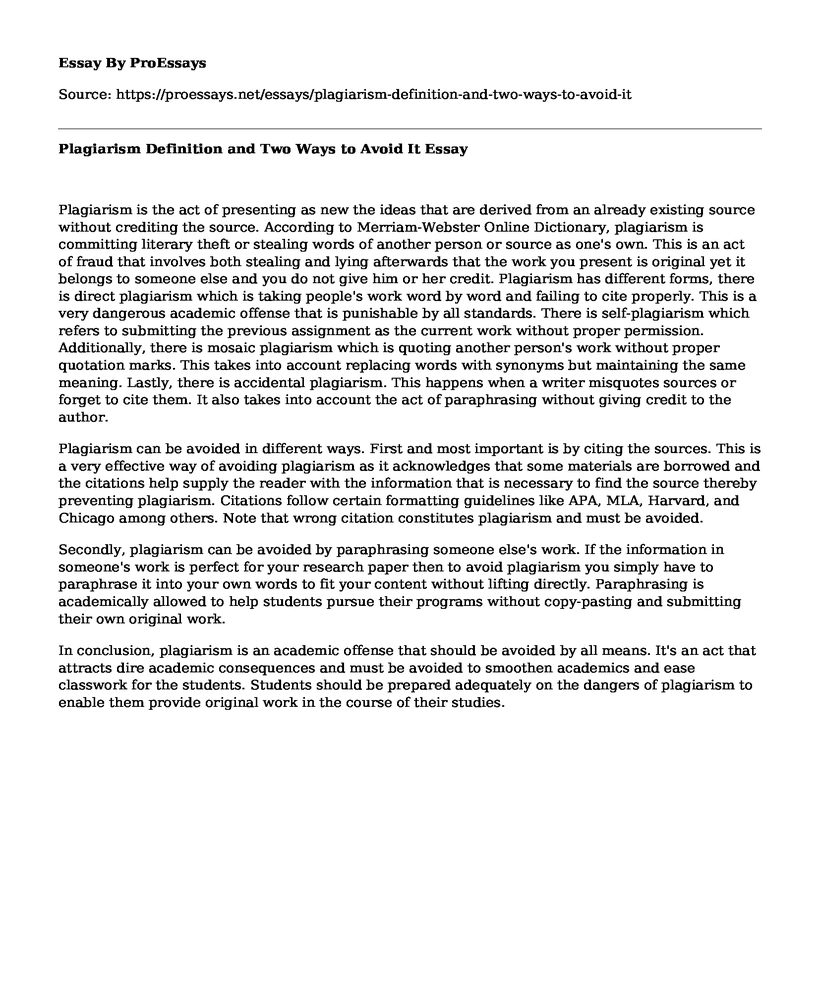Plagiarism is the act of presenting as new the ideas that are derived from an already existing source without crediting the source. According to Merriam-Webster Online Dictionary, plagiarism is committing literary theft or stealing words of another person or source as one's own. This is an act of fraud that involves both stealing and lying afterwards that the work you present is original yet it belongs to someone else and you do not give him or her credit. Plagiarism has different forms, there is direct plagiarism which is taking people's work word by word and failing to cite properly. This is a very dangerous academic offense that is punishable by all standards. There is self-plagiarism which refers to submitting the previous assignment as the current work without proper permission. Additionally, there is mosaic plagiarism which is quoting another person's work without proper quotation marks. This takes into account replacing words with synonyms but maintaining the same meaning. Lastly, there is accidental plagiarism. This happens when a writer misquotes sources or forget to cite them. It also takes into account the act of paraphrasing without giving credit to the author.
Plagiarism can be avoided in different ways. First and most important is by citing the sources. This is a very effective way of avoiding plagiarism as it acknowledges that some materials are borrowed and the citations help supply the reader with the information that is necessary to find the source thereby preventing plagiarism. Citations follow certain formatting guidelines like APA, MLA, Harvard, and Chicago among others. Note that wrong citation constitutes plagiarism and must be avoided.
Secondly, plagiarism can be avoided by paraphrasing someone else's work. If the information in someone's work is perfect for your research paper then to avoid plagiarism you simply have to paraphrase it into your own words to fit your content without lifting directly. Paraphrasing is academically allowed to help students pursue their programs without copy-pasting and submitting their own original work.
In conclusion, plagiarism is an academic offense that should be avoided by all means. It's an act that attracts dire academic consequences and must be avoided to smoothen academics and ease classwork for the students. Students should be prepared adequately on the dangers of plagiarism to enable them provide original work in the course of their studies.
Cite this page
Plagiarism Definition and Two Ways to Avoid It. (2021, Mar 02). Retrieved from https://proessays.net/essays/plagiarism-definition-and-two-ways-to-avoid-it
If you are the original author of this essay and no longer wish to have it published on the ProEssays website, please click below to request its removal:
- Public and Private Schools
- Education Essay Example: School-Based Discipline Plan
- Essay Sample on English Writing
- Essay on Children Education in Homeless Families
- Explaination of Expectations About Own Work Role as Expressed in Relevant Standards
- Children Policy on Ohio For Immigrants - Essay Sample
- Cultural Awareness at American River College







